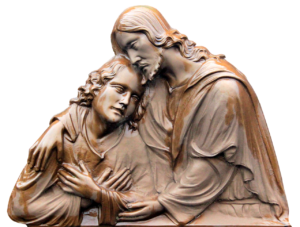 Hello Evan,
Hello Evan,
I am a Molinist, but I’m not sure yet if I should take Matthew 11:21-24 as a case of Jesus having middle knowledge. If I do come to accept that view, it could potentially cause some other problems.
For example, Dr. Craig has said that when a small child is killed or a baby is aborted, they will go to Heaven. He justifies this claim by arguing that God has knowledge of how they would have responded had they matured to a point of being able to understand the gospel. This presents a dilemma. If God saves a person based on his middle knowing that they would have accepted the gospel in another possible world, and one holds that Matthew 11:21-24 is a true case of middle knowledge, then it would seem that the people of Sodom and Gamorrah were actually saved! And countless people who live wretched lives and never repent could end up saving because in some other possible world they would have freely accepted the gospel. If one rejects this horn of the dilemma, then the other horn is that small children or babies that are aborted go to Hell, which I think our moral intuitions know isn’t the case. I suppose one could pose other alternatives like there is an age of accountability taught in scripture and so children (born and unborn) go to heaven while the people of Sodom would not since they were over the age of accountability. The problem here is that I’ve heard many pastors/theologians contest this belief saying scripture does not teach the age of accountability. Is my thinking very flawed? Is this a true dilemma? Please straighten me out!
Thanks,
Jordan
———————————————————————————————
 Bill Craig’s Middle Knowledge Proposal
Bill Craig’s Middle Knowledge Proposal
I, for one, find Craig’s proposal very problematic. Bill Craig posits that given that God knew what kind of life an infant would have freely chosen to have lead if he lived a full life, God can judge the person on that basis. If he would have freely chosen to live a life of terrible evil and depravity and never would have turned to Christ to be saved, God would condemn that infant to Hell. On the other hand, if that infant would have become a follower of Christ if he had lived to adulthood, then God would let that infant into Heaven. Now, this would not apply to the people of Sodom and Gomorra given that when God destroyed them, they weren’t infants. They had already lived to adulthood and lived lives of terrible depravity. God could then judge them on the basis of what they actually did, rather than what they would have done.
By the way, I don’t think Bill Craig holds this view himself. I think he simply puts it forth as a bare possibility. The problem I have with it is that it doesn’t seem fair to judge someone on the basis of what they would have done under certain circumstances, but never actually did. It may be the case that had I been born to a German family at the turn of the twentieth century, that I would have freely chosen to become a Nazi and lead many innocent Jews to their deaths. So then, if that counterfactual of creaturely freedom were true of me (only God knows if that CCF is true or not), would I, born in 1992 long after Hitler was dead, have to answer for the crimes I committed in this unactualized world? Or, when I committed my life to Christ, did His blood wash away these Nazi crimes I never actually committed? That seems absurd. It would seem problematic to say that God can judge people on the basis of what they would have done, because there’s no telling what kind of sins I would freely choose to commit in any given circumstances I never actually find myself in. Think about it! There may be an unactualized scenario in which I commit the blasphemy of The Holy Spirit! The same may go for you or Bill Craig! We’d better hope God doesn’t judge on the basis of His counterfactual knowledge!
Is There An Age Of Accountability In Scripture?
Now, I don’t think we need to posit this middle knowledge solution, because I do indeed think an “Age Of Accountability” view is taught in scripture, despite what many reformed preachers would say.
The most powerful scriptural evidence for the age of accountability is to be found in 2 Samuel 12:21-23. The context of these verses is that King David committed adultery with Bathsheba, with a resulting pregnancy. God sent Nathan to tell David that on account of his transgressions, the Lord would take the child in death. David responded to this by grieving, mourning, and praying for the child. But once the child died, David’s mourning ended. David’s servants were surprised by this fact. They said to King David, “What is this thing that you have done? While the child was alive, you fasted and wept; but when the child died, you arose and ate food.” David’s response was, “While the child was still alive, I fasted and wept; for I said, ‘Who knows, the LORD may be gracious to me, that the child may live.’ But now he has died; why should I fast? Can I bring him back again? I shall go to him, but he will not return to me.” (emphasis mine). David’s response indicates that those who die in infancy go to be with The Lord. David said that although his child couldn’t return to him, he would go to his child. Moreover, this gave David comfort.
Moreover, in Matthew 19:24, Jesus said “Let the little children come to me, and do not hinder them, for the kingdom of Heaven belongs to such as these” (emphasis mine), and “Blessed are the pure in heart, for they shall see God” (Matthew 5:8). What human being could be purer in heart than a newborn infant?
Moreover, God acknowledges in Deuteronomy 1:39 that the children with the Israelites did not know good from bad, and that He would not ban them from entering the Promised Land like he would their parents.
Therefore, although there is no age of accountability explicitly set forth in scripture, we can infer from these passages (and others) that there is an age of accountability.
Now, reformed theologians have given arguments against the age of accountability. They typically appeal to passages like Romans 5 and Psalm 51 to make their case that infants are under God’s condemnation, but I’ve never found these attempts very persuasive. I think, for example, that contrary to popular opinion, Romans 5 is not teaching that God holds all of mankind responsible for the sin Adam committed in the garden of Eden. Rather, because Adam sinned, all of his descendants inherited a sinful nature, because all of Adam’s descendants have a sin nature, they, therefore, sin. Because they sin, they, therefore, come under God’s wrath. What Romans 5 presents us with is not a “Federal Headship” but a series of unfortunate events; a chain reaction resulting from the original sin. This is why, in verse 12, Paul says “Therefore death came to all men, because all sinned“ NOT “Therefore death came to all men, because Adam sinned”. In that case, although babies are born with a sin nature, they haven’t had the opportunity to act on that sin nature yet. They haven’t broken any of God’s commandments nor do they have the ability to do so. Infants can’t kill, lie, cheat, steal, blaspheme God, commit adultery, hate their enemies, commit idolatry, dishonor their parents, or anything The Bible labels as a sinful activity. Since infants haven’t had a chance to do any of these things, it would be unjust for God to send them to Hell. He would be punishing people for no reason.
If you’re interested in a more thorough, in-depth defense of The Age Of Accountability, check out my book A Hellacious Doctrine: A Defense Of The Biblical Doctrine Of Hell. I talk about The Age Of Accountability In Chapter 4.
On Matthew 11:21-24
This is undoubtedly an example of counterfactual knowledge on Jesus’ part. Whether or not this is “middle knowledge” will all depend on where one places it in logical priority. A lot of people think that if they can demonstrate from scripture that God has counterfactual knowledge, that they, therefore, have demonstrated that God has middle knowledge, and therefore Molinism is true. That is not the case. Counterfactual knowledge is only middle knowledge if God possesses it logically prior to His decision to actualize a possible world. If God possessed knowledge of counterfactuals logically posterior to His decision to create, then Matthew 11:21-24 and other passages like it aren’t presenting us examples of middle knowledge. The thing to discern then, is where Jesus’ knowledge of what Sodom would do falls in logical priority in His knowledge.
Kirk MacGregor as presented a very compelling argument for middle knowledge.
1: God either possesses knowledge of counterfactuals logically prior or logical posterior to His creative decree.
2: If human beings have libertarian free fill, Then God possesses His counterfactual knowledge logically prior to His creative decree.
3: Human beings have libertarian free will.
4: Therefore, God possesses His counterfactual knowledge logically prior to His creative decree.
This is a logically valid argument. The conclusion follows from the premises. If all 3 premises are true, then it follows that the conclusion is also true. So, are these premises true or are they false?
Premise 1 is true by the law of excluded middle and the biblical evidence that God does possess knowledge of counterfactuals. The Bible presents examples (e.g Matthew 11:21-24) of God having the counterfactual knowledge so the only question would be when, logically speaking, He possesses it. There are only two options: He knows it logically before His decision to create or afterward. There are no two alternatives. This premise shouldn’t be debatable for any non-Molinist.
In defense of premise 2, MacGregor notes,
“Suppose God possesses his counterfactual knowledge logically posterior to his creative decree. Then it is God who decrees what every possible individual would do in any possible circumstances. In that case, no possible individual has soft libertarian freedom (a range of options from which they can choose). For any circumstance, God has locked them into one course of action. From these considerations (2) follows.”
Consider this scenario: if people don’t have the libertarian free will (LFW), then unsaved sinners wouldn’t even be able to choose between varying evil actions (e.g robbing a bank VS. robbing a gas station convenient store). It would be impossible for a Christian to choose between reading an NIV Bible or a KJV Bible.
If every counterfactual that God knows regarding our choices, He knows as a result of His decision to create, then the statement “If Bob was in circumstance S, He would choose A instead of B” is only true because God decreed it to be true, and if the counterfactual statement is true because God decreed it to be true, then Bob would not be freely choosing A instead of B in circumstance S. He would be choosing what God made Him choose. If all of God’s foreknowledge is logically posterior to His creative decree, then this world is a puppet world: God causally determines everything we’ve done, do, and will do. Moreover, His counterfactual knowledge is, in a sense, merely knowledge of what He would freely do in any given circumstance. It’s knowledge of what He would causally determine us to do in other circumstances. If determinism is the logical entailment of logically posterior knowledge, then what that means is that if determinism is false, then what that means is that God knows what He knows logically prior to His creative decree.
Premise 3 would be the really controversial premise. Much could be said by way of defense of this premise. One could appeal to Tim Stratton’s “FreeThinking Argument” to demonstrate that we do, in fact, have a libertarian free will. One could also appeal to scriptural evidence in support of this, for example, 1 Corinthians 10:13, Deuteronomy 30:11-20, Joshua 24:14-15, Ezekiel 18:21-24, etc. Or one could argue on the premise that if man doesn’t have free will, God can’t judge us justly, but it’s impossible for God not to judge justly, therefore, we have libertarian free will (which I do in my blog post “5 Arguments For The Existence Of Free Will”). These all give us sufficient grounds for affirming premise 3.
I think all 3 premises are true and can be evidentially supported, in which case it follows, that “Therefore, God possesses His counterfactual knowledge logically prior to His creative decree.” Which is just a more verbose way of saying “Therefore, God has middle knowledge”.
Conclusion
I don’t think there is a dilemma. I think we do have good scriptural grounds for affirming The Age Of Accountability, so we don’t need to adopt the problematic concept of God dealing with infants on the life they would have lead if they hadn’t died as babies. Additionally, I think Matthew 11:21-24 is an example of God’s middle knowledge, but only because we have good reason to think God knows counterfactuals logically prior to His creative decree.
If you have any questions about Christian theology or apologetics, send Mr. Minton an E-mail at CerebralFaith@Gmail.com. It doesn’t matter whether you’re a Christian or Non-Christian, whether your question is about doubts you’re having or about something you read in The Bible that confused you. Send your question in, whatever it may be, and Mr. Minton will respond in a blog post just like this one.
Discover more from Cerebral Faith
Subscribe to get the latest posts sent to your email.





accountability
No one is destined to Hell from birth. We are born with a sin nature which is a proclivity to sin but no one is born guilty of sin. An infant is born in innocence and remains so until they reach the age of accountability.
Isa 7:14 Therefore the Lord himself shall give you a sign; Behold, a virgin shall conceive, and bear a son, and shall call his name Immanuel.
15 Butter and honey shall he eat, that he may know to refuse the evil, and choose the good. (Even Christ needed to reach the age of accountability to know good from evil.)
De 1:39 Moreover your little ones, which ye said should be a prey, and your children, which in that day had no knowledge between good and evil, they shall go in thither, and unto them will I give it, and they shall possess it.
Heb 5:14 But strong meat belongeth to them that are of full age, even those who by reason of use have their senses exercised to discern both good and evil.
There are some who by reason of mental incapacity never reach an age where they are accountable for their actions and therefore remain in the mercy of God and are never accounted guilty of sin.